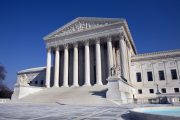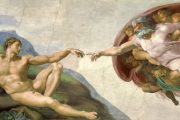
It is not capitalism that has failed, but crony capitalism — Robert F. Kennedy, Jr.
The Constitution was built for hard times. It is the heart and soul of our country — RFK, Jr.
The gulf between principles and practice, doxa and praxis, is eternal — all the more so when it comes to the politician.
When you think of a GOP candidate, in particular, you think of neither creed nor action, but, rather, of a list of talking points and policy positions to the exclusion of bedrock principles.
“God, groceries and gas” was how one gaseous hack smugly summed up what Americans need, to Sean Hannity of the near-defunct [chuckle] Fox News channel. That, and promises seldom kept.
Aside from a native intelligence — and to distinguish from his rotten party’s political plank — Robert F. Kennedy, Jr., conversely, does articulate a creed that respects liberty. Whether he will act on this commendable worldview once in office is unknown.
As it emerged from the RFK, Jr., announcement for president, his worldview departs from that of the progressive Democrat Party’s, which he has decried as “the party of fear, war and censorship … neocons with woke bobble-heads.”
RFK, Jr.’s philosophy of liberty, moreover, appears wedded to reality. He doesn’t jabber GOP-style about a return to small government and the passing of a balanced budget amendment.
Such totem Republican “small-government” words are as good as Orwellian Newspeak in concealing the truth, as they are dumbly and dangerously unmoored from reality, and thus meaningless, mere reductive talking points.
With an accreting $31.8 trillion in national debt, and some $200 trillion in unfunded liabilities incurred by federal and state governments, the United States of America is beyond such asinine talk. There is no coming back from this kind of government gigantism, from such Federal Reserve and state-driven chicanery, with which Robert F. Kennedy, Jr. seems familiar and to which he speaks knowledgeably.
Your columnist’s task over the decades has been to address reality, not to levitate in the arid arena of pure thought. Kennedy does the same. As does he appear to grasp that the natural law of the Constitution has been buried under piles of statute and administrative-law precedent. He knows this all too well, having spent his working life litigating against the Deep, Regulatory, Administrative, Security, Welfare-Warfare State.
Localism
The thing that most inspires about an old-school presidential candidate such as Robert F. Kennedy, Jr., other than his spirituality and intelligence — unusual relative to all other candidates — is his authentic Americanism, by which I mean his knowledge of and deep attachment to American history, community, and patrimony.
This authentic Americanism is expressed in RFK, Jr.’s natural localism. From his abundant and important storytelling, as it emerged in his announcement for president, American history is the history of its people — not the history of the Federal Government’s gory, glory wars and its many conquests and usurpations. As he tells it, the history of America tracks with that of real families, like the old fishing families who are no more. For centuries, these communities had lived off and along the Hudson River.
And so, he spoke at length about the villagers on the Hudson, and their relationship to the river, both a source of food and fun — “their French Riviera” — before it was contaminated by the colluding quislings of industry and state.
Corruption invariably flows from state to society. RFK, Jr., thus also addressed classic agency capture, which is how regulations are implemented: by the regulated in cahoots with the state, always against the interests of the people — be it the military-industrial complex and its stake in perpetual war, the Agribusiness conglomerates, or Big Pharma and its latest malignant offshoot, the Covid cartel.
Also pleasing to this paleolibertarian is Kennedy’s praise for free-market capitalism long-lost. The historic fishing families that fished along the Hudson River are gone, he argued, not because “their business plan did not work,” for “they had enriched the history, culture and palate of New York for three and a half centuries.” Free market capitalism had worked perfectly for them, protested RFK, Jr. Nature in her abundance had been a reliable social safety net — victims of the great depression could fish and feed their families. Now they must look to the welfare state for sustenance.
What eliminated these authentic communities is corporate, crony capitalism.
Is there another politician who speaks not only to the difference between free-market capitalism, RIP, and crony corporate capitalism, under whose yoke we labor — but also categorically praises the first and damns the last?
Lockdowns
Robert F. Kennedy, Jr. was all teeth and talons against the lockdowns back when it counted — and now. Never forget!
Tarting-up or forgetting the lockdowns won’t wash.
How right RFK, Jr. is when he says nobody wants to talk about the lockdowns, as both political factions promoted or failed to stop the invasion and occupation of American bodies and businesses.
You cannot have a stable democracy without a middle class, something upon which Pat Buchanan had always insisted. The lockdowns decimated the American middle class, destroying 3.3 million small businesses and resulting in the highest excess death rate in the world: America’s. The cost of lockdowns to the economy, according to Harvard economist Larry Summers, was $16 trillion. It constituted the biggest transfer of wealth in human history, argues Kennedy, with $4 trillion having been shifted from middle class to super rich.
Other than Naomi Wolf, Tucker Carlson (who, chuckle, destroyed the War Party News Channel), and Glenn Greenwald, few have been the public figures to describe the effects of the lockdowns on small-business owners (well-represented among the Kennedy-supporting crowd) with such persuasive passion, compassion, and grasp of the facts, delivered extemporaneously.
The Constitution
Certainly no politician has spoken with such emotion about the foundational right of free speech trashed, and about the crucial role of our cherished U.S. Constitution in commanding us to respect its First Amendment and practice due process of law.
Robert F. Kennedy, Jr. the historian reminded his audience how inviolable that Constitution is meant to be, by harking back to the Revolutionaries who did battle with Britain during many a deadly plague, state mitigation of which was never instantiated in the founding documents.
He even let fly at Lincoln because the 16th president flouted the Constitution when he abolished habeas corpus, a right of petition currently suspended for many Americans who languish in jail without due process of the law. This disgrace Candidate Kennedy must openly eschew and remedy, as the Radical Republicans have failed to.
Free all January 6 political prisoners; and rescue Julian Assange, the greatest libertarian alive, if barely.
Kennedy remarked, not unfairly, that, while “president Trump [is] blamed for a lot of things that he didn’t do,” he is most certainly to “blame for the lockdown.” The Covid lockdowns were “the worst thing that [Trump] did to this country, to our civil rights, economy and middle-class.”
“President Trump, in fairness — let me make this point. President Trump will say that ‘the lockdown wasn’t my idea, the bureaucrats rolled me on it. I said we shouldn’t do it.'”
“But that’s not a good excuse,” countered candidate Kennedy.
“You need a president in this time of history who can stand up to his bureaucracy.” Over and above that Sisyphean task, America needs a president who can defang the bureaucracy for good.
THE HARD TRUTH companion podcast to this column is, “Tucker Removed by Fox. Robert Kennedy Jr. Against The Deep, Warfare, Woke, Industry-Captured State. We thank you for your Follow.




